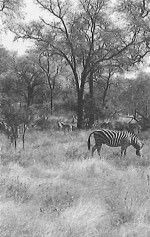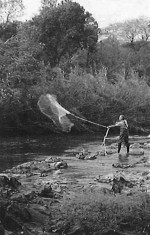The Network Office has been very active this past year in obtaining funds from NSF to facilitate scientist exchanges and interactions to achieve the goals identified by the ILTER Network Committee. These goals are based on the results of an International Summit Conference in 1993 that identified the need for collaboration among the numerous scientists and high-quality programs that are involved in understanding the various areas of our globe.
More specifically, the main objectives identified were to:
- Promote and enhance understanding of long-term ecological phenomena across national and regional boundaries
- Facilitate interaction among participating scientists across sites and disciplines
- Promote comparability of observations and experiments, the integration of research and monitoring, and encourage data
- Enhance training and education
- Contribute to the scientific basis for ecosystem management and improve predictive modeling at larger spatial and temporal scales
Based on the recommendations of the summit’s working groups, directives for the U.S. LTER participation in an International LTER (ILTER) program include:
- Assisting in the establishment of networks for long-term ecological research in other countries
- Creating programs and scientist exchanges between U.S. and foreign LTER sites and networks
- Developing and operating a communication and data sharing system among an international network of sites
We have made considerable progress in meeting these objectives. Each country must assess its own needs and resources if it wishes to be involved in an ILTER program. Each will have a unique set of opportunities and limitations that are best evaluated by the scientists and policy makers of that country. The typical procedure is for the scientists of a country, along with funding agencies, to decide whether to endorse the premise that ecology and environmental management are significantly benefited by long-term and broad spatial scale studies. The LTER Network Office and teams of LTER scientists have played a significant role in promoting these scientific needs in different countries. Representatives of a country then develop a plan that establishes the context and mission for such studies. Sites and programs are identified that will contribute to this mission, and support is obtained from either within a country or from international organizations (e.g., World Bank, European Commission) for implementation and continued maintenance.
Exchanges of scientists are encouraged. Considerable effort has been developed by the U.S. network office for international electronic communication and data management training. It is anticipated that each participating country’s program will be part of a global network of scientists and scientific information that will advance our understanding of not only local and regional issues, but also global concerns-as well as provide solutions to environmental problems at these scales.
It is important to recognize that the various countries in this network have developed missions specific to their needs, but with common objectives with other LTER programs. For example, the Chinese Ecological Research Network’s (CERN) objectives are to:
- Advance ecological research
- Contribute to global ecological research
- Study and demonstrate methods for sustainable management of ecosystems
- Provide a scientific basis for decision making on environmental issues.
In Brazil the objectives are to:
- Develop a collaborative effort by scientists and students on sites distributed throughout the V country’s five major biomes
- Develop a research agenda around the topics of conservation of biodiversity, pattern and control of primary and secondary production, population dynamics, organization of communities and ecosystems, nutrient dynamics and the effects of natural disturbances and human impacts.
At this point, the following countries have established programs that are participating in an ILTER Network
- Australia
- Brazil
- Canada
- China
- Czech Republic
- Hungary
- United Kingdom
- United States
- Taiwan
Other countries are in various stages of developing LTER efforts that we expect will be added to the international effort:
- Argentina
- Colombia
- Costa Rica
- Ecuador
- Jamaica
- Japan
- Mexico
- Mongolia
- Panama
- Portugal
- Spain
- Venezuela
The U.S. LTER has participated in workshops and scientist exchanges with many of these countries.
Recently, the first Latin American LTER meeting was held in Puerto Rico. This was funded by the U.S. Forest Service and organized by Bob Waide (Luquillo LTER) and staff from the Network Office. This workshop was important because the ILTER Network Committee recognized the importance of Central and South America to global ecology and made a commitment to concentrate on this region. The countries that participated in that workshop are making excellent progress toward developing LTER programs.
Africa represents another important region recognized by the ILTER Network Committee. James Gosz recently completed a visit to South Africa to promote LTER research and international networkworking. His visit was well received, and activities are now underway to identify LTER sites and develop a research program potentially funded by the Foundation for Research Development (PRD). South Africa also is interested in interacting with other countries in south and east Africa to form a larger collaborative regional effort. Next there will be a scientist exchange to initiate more extensive interaction and collaboration.
LTER sites in the countries of the ILTER Network now can provide unparalleled opportunities for cross-site and comparative research efforts on many of the world’s ecosystems. These global LTER sites function as “research platforms” that lead to interdisciplinary research, allow extrapolation to larger areas or regions, provide the scientific basis for management and policy decisions that incorporate social and economic issues, and attract scientists from other sites and networks-effectively expanding the “network” of sites.
An important goal of the overall effort is to enhance the communication and translation of results and to increase the value of individual programs at individual sites, and ultimately their collective value. We anticipate that the ILTER effort will contribute significantly to other international efforts such as the Global Terrestrial Observing System (GTOS) and the International Biosphere-Geosphere Project (IGBP). GTOS is being formed because we do not know how, where, and over what time frame humankind is endangering terrestrial and freshwater ecosystems. Moreover, we do not fully understand the role of these ecosystems in global processes. We cannot answer these questions because of the lack of spatially and temporally comprehensive data on the physical environment and on biological processes in these ecosystems. ILTER can complement the scientific process in major ways that will address these concerns.

 Enlarge this image
Enlarge this image

